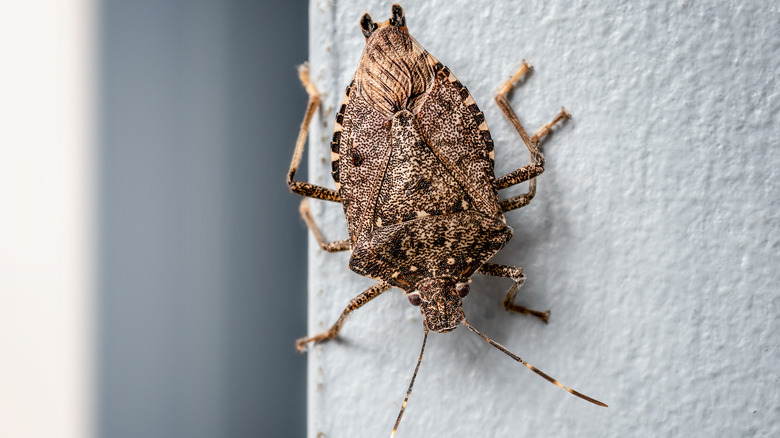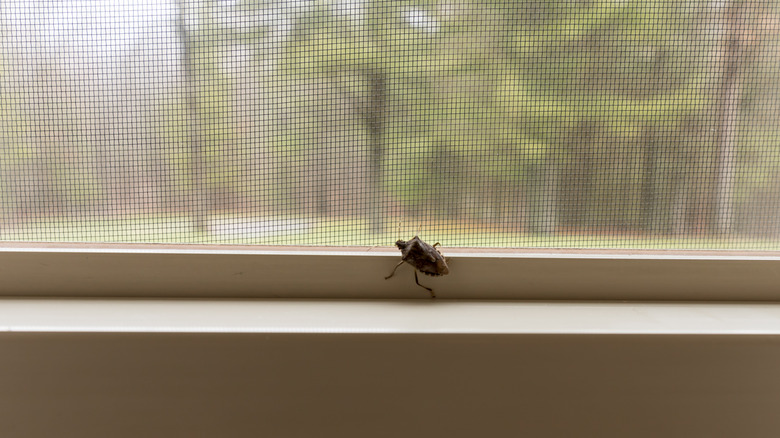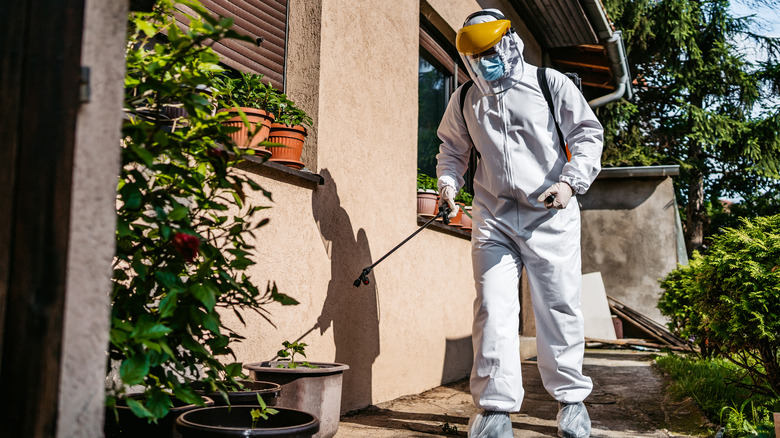Why It's Important To Not Just Repel But Eliminate Stink Bugs (& What To Use)
We all recognize them. They're virtually silent as they crawl around your home, leaving you unaware of their presence until one drops from the window frame onto your arm. These pests, including the common brown marmorated stink bug (Halyomorpha halys), are easy to spot because they look like they have a shield on their back. No more than an inch in length, they can range from green to brown and may even have some yellow or red markings on them. You'll really know you've found one if you step on it, which causes the release of quite a foul odor.
It's true that stink bugs aren't likely to cause harm to you or your pets, but they're not welcome guests in your home, and shouldn't be in gardens either. They are invasive, known for overtaking gardens and plants both inside and outside the home. They can significantly damage fruits and vegetables, often leaving the fruits produced unusable. They have some natural predators, but there are very few, especially for the adults — and such predators need to be encouraged into the garden in the first place. Ultimately, this leaves the hard work to repel and remove stink bugs on your shoulders.
Repelling them helps to keep them from invading your home (a skill they're good at when the weather gets cold enough). However, if they're already present, it's essential to learn how to get rid of stink bugs from your home and garden. The combination of sealing your home and using professional pest control may work.
Prevention is the best way to repel stink bugs
It's far easier to prevent stink bugs from entering your home than it is to deal with them once they make their way inside. For indoor pest management, you'll need to work on sealing the home. It's not easy to do, because these small pests will find holes in window screens, small gaps in the door frame, holes in the siding, and even the heating and cooling vents to make their way in, especially during the colder months. Once inside, they can lay eggs and wait for spring.
You can also try out the use of essential oils, which the Journal of Applied Entomology shares could help repel these undesired houseguests from coming into your home. One powerful stink bug DIY repellent can be made with essential oils like spearmint, lemongrass, and clove, all of which have a strong odor to them. Place this near common entry points, such as near the window air conditioner, or the back door that doesn't close properly.
The real challenge comes from repelling stink bugs in the garden. There's no simple way to do this, but try to create an area that is undesirable to them. To prevent them from attacking your vegetable plants if you know they're nearby, consider using crop row covers over the plants made of polyester. That blocks their access to food and may encourage them to move on.
Getting rid of stink bugs in your home and garden
Spotting stink bugs in your home means you need to up the ante in terms of getting rid of them. There are nearly no organic pesticides that will eradicate them easily, even if they kill a few bugs. There are chemical products available that could offer help, but if the infestation is significant, it's often best to leave the work to a professional.
If you plan to do it yourself, though, seek out insecticides that are broad spectrum for the best results. This may include insecticidal soap and pyrethrin. However, note that stink bugs in your home are annoying but not dangerous. Weigh that fact with the use of chemical-based pesticides before making the decision to use over-the-counter products of any type. As for the garden, that's not easy either. You could encourage some of the potential natural predators into your garden early on when stinkbug eggs are present, including assassin bugs and earwigs. Birds may munch on these bugs, too, so placing a bird feeder nearby could help encourage them to sample stink bugs as well. If it's early in the year, botanicals could offer some help, but if you have mostly adult stink bugs, the application of insecticides on a broad scale may not be effective.


